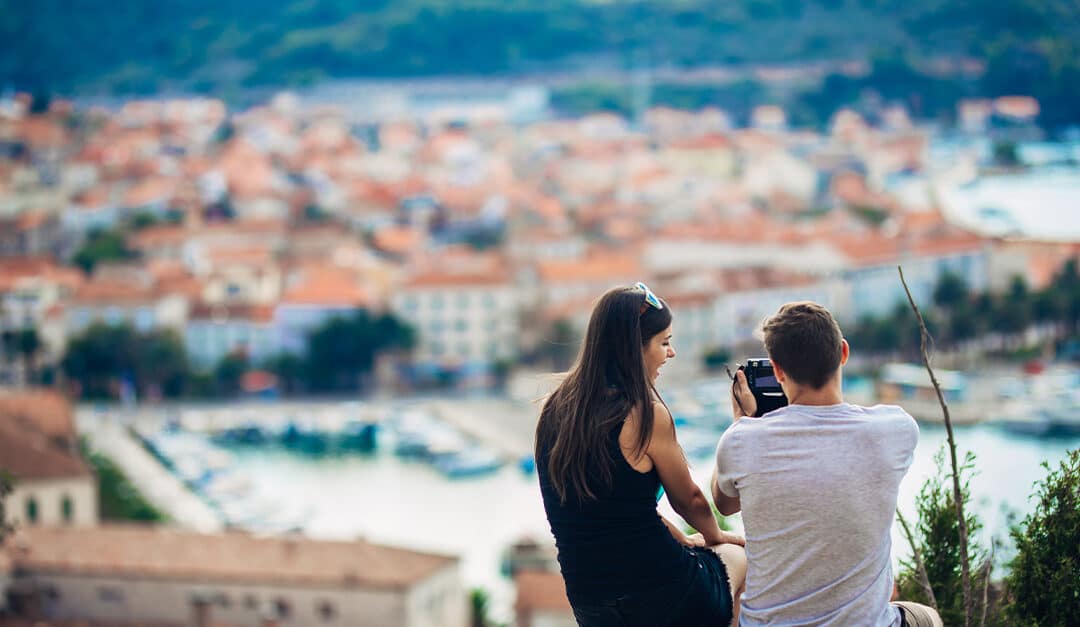Oh, Portugal! What an enchanting country! Oh, you’re going there soon? That’s amazing. You won’t regret it. It has wonderful medieval towns to wander around, beautiful architecture, mysterious monasteries, amazing beaches, and overall mind-blowing landscapes.
Maybe you can go to the town Obidos, or visit the popular palace Palacio da Pena. Or even surf at Nazaré, a well-known village for its gigantic waves!
Whatever you do, we highly recommend you learn some basic Portuguese phrases for traveling to Portugal. Knowing at least a bit of Portuguese vocabulary will help you to ask for some basic necessities. It’ll also allow you to find your way in case you get lost, or even better, it’ll help you not to get lost.
So, are you ready to learn and get the best experience on your trip? Get the stress of the foreign language behind, because TruFluency is here to help you! Check our guide to the basic words and phrases in Portuguese you must know to travel around Portugal.
European Portuguese Words for Traveling
Here are some essential traveling words in European Portuguese you’ll most likely use at least once when touring Portugal.
- Airplane – Avião
- Airport – Aeroporto
- Money – Dinheiro
- Debit card – Cartão de débito
- Credit card – Cartão de crédito
- Food – Alimento
- Bathroom – Casa de banho
- Taxi – Táxi
- Yes – Sim
- No – Não
- Please – Por favor
European Portuguese Greetings
This is probably the most basic thing you have to learn when traveling to Portugal. What if you find yourself in a situation where a local greets you? You don’t want to pass as rude just because you don’t know how to answer. So, here are some basic greetings in Portuguese for you to go around saying hi to everyone:
- Hello – Olá
- Hi – Oi
- Good day / Good morning – Bom dia
- Good afternoon – Boa tarde
- Good night – Boa noite
- Hi – Boas
- Pleased to meet you / Nice to meet you – Prazer em conhecê-lo (for men) / Prazer em conhecê-la (for women)
- It’s been a long time – há tanto tempo
- How are you? – Como estás? (this is more informal) / Como está? (this is more formal)
- How have you been? – Como tens estado?
- Is everything okay? – Está tudo bem? / Tá tudo bem?
- Everything okay? – Tudo bem? / Tudo ok?
- Are you okay? – Estás boa? (for men) / Tás boa / Estás bom? (for women) / Tás bom?
You can even combine some of these. For example: “Olá, boa tarde” (Hello, good afternoon). Or “oi, bom dia” (Hi, good morning). Or even, “oi, tudo ok?” (hi, is everything okay?).
European Portuguese Goodbyes
If you’re going to greet the country and its people, it’s only proper that you also learn how to say goodbye. After all, goodbyes are a part of life, and it also shows you care.
- Goodbye – Adeus
- Goodbye – Adeusinho (more informal that the one above; it’s a diminutive)
- Bye – Tchau!
- Bye bye – Tchauzinho!
- See you soon – Até já / Té já (informal)
- See you later – Até logo / Té logo (informal)
- See you tomorrow – Até amanhã / Té manhã (informal)
- Until next time – Até à próxima
- Have a good rest of the day – Resto de bom dia / Boa continuação
- Kisses – Beijinhos
We must say that you can also use the greetings “bom dia”, “boa tarde”, “boa noite” and “Prazer em conhecê-lo / Prazer em conhecê-la” as a goodbye. You can mix those with one of the goodbyes above. For example: “Adeus, Prazer em conhecê-lo” (Goodbye, nice to meet you). Or “Tchau! Boa tarde”.
Thanks in European Portuguese
Thanking is something you must do when you travel to Portugal – or, honestly, to any country. It’s another way of showing your education. Even more important, it’s also something really nice to do to a country and the people there that are helping you in any way. That’s why “obrigado” is a must in your Portuguese dictionary. It means “thank you”.
But is it “obrigado” or “obrigada”? Have you heard both ways? Well, that’s because both are correct! They simply have to be used by different people. You say “obrigado” if you’re a man. You say “obrigada” if you’re a woman. It’s as simple as that.
If you want more sentiment because you’re super grateful, just add “muito” in the beginning. So, “muito obrigado” or “muito obrigada”. This means “thank you very much”.
Phrases in European Portuguese You’ll Need for Conversation with Locals
- I’m so sorry, I don’t speak Portuguese – Sinto muito, não falo português
If you clicked on this blog, it’s because you want to be prepared for your trip with basic Portuguese vocabulary. But that doesn’t mean you’re fluent in this language. Regardless, maybe a local will keep on talking to you in Portuguese if they hear you say a word or two in that language.
Though that’s good practice, it’s not really good for you if you don’t understand anything they’re saying. Just use this phrase, so they understand you’re not an expert yet. There’s no shame in that. They’ll still see you prepared as much as you could.
- I know how to speak a little bit of Portuguese – Eu sei falar um pouco português
If you do know a little bit more vocabulary and are a bit fluent in Portuguese, use this phrase to let natives know that. It will show them you feel ready for the challenge of a conversation. But, at the same time, they might have more patience since you’re still not at an advanced level.
- Can you speak more slowly? – Pode falar mais devagar?
When learning a language, it usually happens that when a native is speaking their mother tongue, they speak faster than we can understand them. Even if you do speak a bit of Portuguese, maybe you’re not hundred percent fluent and so you need help. That help could be just for the other person to speak more slowly. Use this question to ask them nicely if they can do that.
- Do you speak English? – Você fala inglês?
English is a very important language around the world due to its popularity. Many people know it. So, it’s a good language for two people to communicate in if they don’t know each other’s mother tongues. It’s like a middle ground.
If you’re not ready for a full conversation in Portuguese, use this question to ask others if they know English. Maybe they’ll be willing to speak in English with you, so you can understand more.
But maybe you don’t feel comfortable speaking in English or it’s not your first language. Then, change the word “English” in this question for the name of your native language to know if by any chance they speak your mother tongue. For example: “Você fala espanhol?”
Directions in European Portuguese
Knowing how to ask for directions is essential when you travel abroad. We’re sure you know that, especially if this is not your first trip. So, here are some basic phrases and questions for you not to get lost:
- Where’s the bathroom? – Onde se encontra a casa de banho
- I want to go to… – Quero ir para…
- Excuse me, do you know how to go to…? – Desculpe, sabe como ir para…?
- Excuse me, how can I get to…? – Desculpe, como posso chegar á/ao…?
- How many blocks away is the museum? – A quantos quarteirões fica o museu?
- It’s near here – É aqui perto
- Straight ahead – Em frente
- Left – Esquerda
- Right – Direita
- Turn around here – Dar a volta aqui
- It’s around the corner – Está ao virar da esquina
- To go up the street – Subir a rua
- To go down the street – Descer a rua
Phrases in European Portuguese for a Restaurant
- Can I see the menu, please? – Posso ver a ementa, por favor?
- I’d like a…, please – Queria um/uma…, por favor.
- I’d like to drink… – Quero beber um/uma…
- I’d like a table for two, please – Quero uma mesa para dois, por favor.
- I’d like another coffee, please – Queria outro café, por favor.
- Can I get the check, please? – Pode dar-me a conta, por favor?
More Phrases in European Portuguese
So far, we’ve seen many phrases you’ll need in Portugal. But there are many more we could teach you. But, of course, just one blog won’t be enough to make you an expert. Nonetheless, we feel there are a couple more phrases and questions you should know:
- How much does it cost? – Quanto custa?
- Excuse me, please – Com licença, por favor.
- My name is… – Meu nome é…
- What’s the form of payment? – Qual é a forma de pagamento?
- Could you repeat it, please? – Pode repetir, por favor?
- I need help – Preciso de ajuda.
- I need a doctor – Eu preciso de um médico.
Idioms from Portugal
Idioms are super common in every language and country, so they’re a must when traveling. That’s why we leave you a couple of idioms from Portugal, so you don’t get confused and can use them in conversations:
- Está a chover a potes
This idiom means it’s raining a lot. And though when we travel abroad, we want the best weather, sometimes that’s not possible and it rains too much. This is the perfect idiom for that situation. Hopefully, that’s not your case. But we think that even if it happens, you’ll have a great day.
Its English equivalent would be: “It’s raining cats and dogs”.
- Custar os olhos da cara
This means that something is very expensive. It’s like the English idiom: “cost an arm and a leg”. It’s perfect in case you want to buy a souvenir for someone, but it costs too much.
- Apanhar com a boca na botija
This means somebody caught you doing something that’s wrong or forbidden. Its English version would be: “Catch red-handed”.
Practice Makes Perfect
Now you have the list for the words, phrases and expressions you must learn to travel to Portugal. Of course, this will help you in many more situations, not just for your trip. But the truth is, you can’t just memorize each phrase. You have to know how and when to use it.
We have some examples here, but you need to practice to truly understand everything and reinforce the knowledge. Practice makes perfect. So, besides reading this blog, how else could you practice your new Portuguese vocabulary?
Read something. Of course, reading books will bring you tons of benefits. You’ll have different characters with different vocabulary, tones, and life perspectives. So your own vocabulary will grow a lot. You’ll also have fun as you’ll be interested in the story.
But, it’s okay if you prefer other ways of reading, like magazines, newspapers, and articles. Everything helps. No matter what you read in Portuguese, you can always learn grammar and spelling and increase your personal dictionary.
You could also listen to music from Portugal and do some karaoke. Listening to music is a very casual and natural way of learning. Because it won’t feel like anything has changed. If you always listen to music, just put some Portuguese playlist as a background while doing chores.
You’ll notice how gradually you’ll start picking up words, phrases and pronunciation. Then, start singing along to practice your speaking.
Another way, and a very important one, is to speak. Just talk to your language classmates, your Portuguese partner, your neighbors from Portugal, or anyone you have that knows the language.
It’s easier to start talking in your second language with someone you know than with a stranger. You’ll probably feel more comfortable making mistakes and asking doubts. So, speak, speak, speak.
Hey! Yes, You! Come Here, We Have One More Portuguese Learning Tip for You!
Ready? Enroll in our TruFluency Portuguese classes with a native teacher! That’s right, you’ll be learning from a native Portuguese speaker. That means you can be sure everything you’ll learn it’s actually used in real life by native speakers. Plus, you’ll get to hear the real Portuguese accent since your very first class and start training your ear.
But the cool things don’t end there! All our classes are customized to your needs and goals. So if you tell us that you want more traveling vocabulary, we’ll help you with it.
It gets even better with our Bellieu Method. This is an educational method created by our founder and CEO, Micah Bellieu, to help you achieve language fluency. We use it in every class, and it consists of speaking using all you’ve learned. Yet again, one more tool to practice your speaking, so important for real-life conversations during your trip.
You can take two one-hour trial classes now for only $59! They’re completely online and we have flexible schedules. Your first class will be about assessing your needs and plan to achieve your goals. So everything about your language journey ahead is totally clear. In our second class, you’ll see how well we work.
Ready? Até já!





